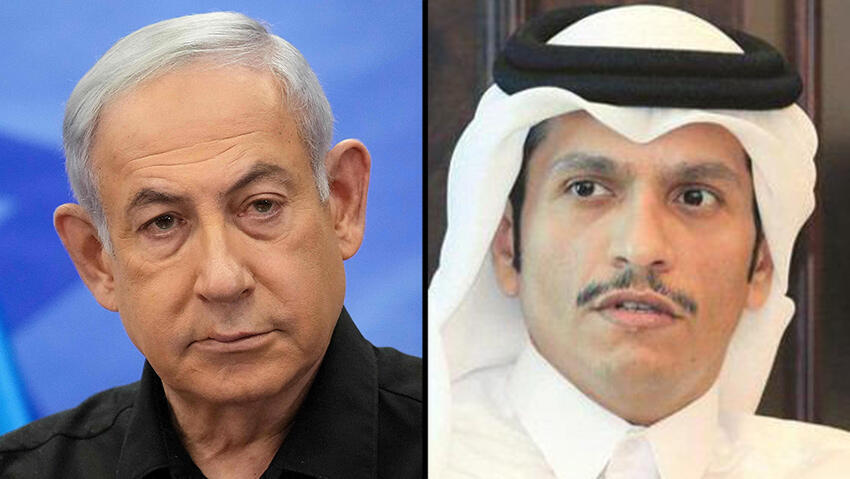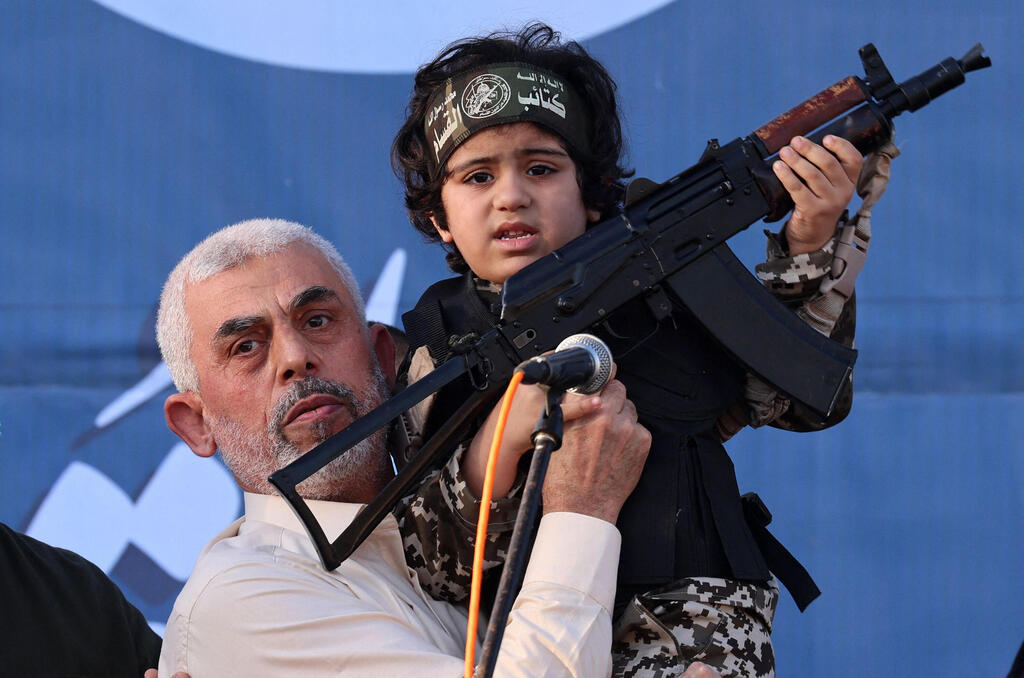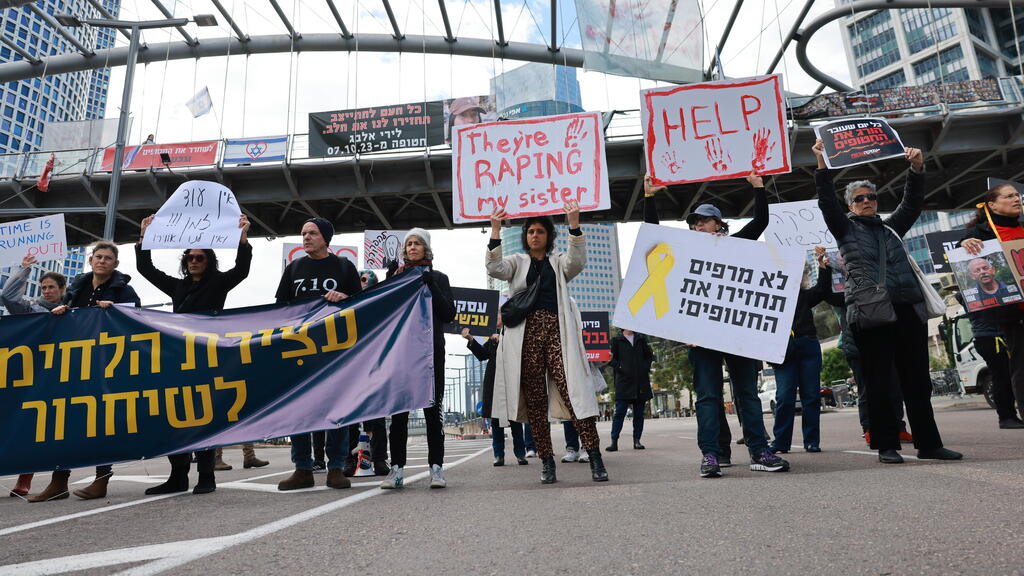Getting your Trinity Audio player ready...
Qatar's Prime Minister Mohammed al-Thani said Monday evening that the talks toward a deal to return the Israeli hostages "are improving," and that he hopes to transfer the framework of the deal to Hamas "and bring about a situation where they cooperate constructively." He noted that "the escalation in Gaza will not lead to progress regarding the return of the hostages. The regional demand is to put an end to the war in the Gaza Strip."
Read more:
Al-Thani was referring to Sunday's Paris summit, led by the head of the CIA William Burns and in the presence of the head of the Mossad David Barnea, the head of the Shin Bet Ronen Bar, Major General Nitzan Alon, who commands the intelligence system at the hostage headquarters, and the head of the Egyptian intelligence Abbas Kamel.
3 View gallery


Israeli Prime Minister Benjamin Netanyahu and Qatar's Prime Minister Mohammed al-Thani
(Photo: Christophe Ena / AFP)
"Yesterday there was good progress to lay a foundation for a way forward with the talks," according to al-Thani. "We have moved in the talks to a place that can lead us to a cease-fire."," he also said, adding: "We cannot control the reaction of Hamas, but we are committed to efforts. The two-state solution requires a responsible partner on the other side. Israel has always been the obstacle to a two-state solution."
In the shadow of Israel's criticism of Doha's performance, he said: "We are mediators and not a party to the conflict and are trying to bridge the gap." Al-Thani emphasized that "our main task is to work toward reaching a solution that will lead to the release of hostages and an end to the attacks in Gaza. We have moved in the talks to a place that can lead us to a cease-fire."
Israel on Monday evening denied the reports of an agreement regarding the number of prisoners to be released as part of a future hostage deal, following a report on the Arabic-language Sky News network.
The report noted that the first phase of the deal will include the release of 35 Israeli hostages in exchange for the release of between 100 and 200 security prisoners for each Israeli hostage. In Israel, officials said that there was no discussion at all about the number of prisoners to be released as part of a deal and that the report is not true. An official denial on the subject was also issued by the Prime Minister's Office, which claimed that "the reports about the deal are not true and include conditions that are not acceptable to Israel."
However, in Israel officials confirm that there is a discussion about how many cease-fire days the deal will include. According to sources in Israel, it is estimated that the pause in fighting will last less than two months. But the NBC network reported Monday that Israel is still waiting for a response from Hamas about the proposal that was negotiated at the Paris summit, and which according to the report Israel agreed to, which was to be sent to the terrorist organization on Monday.
According to the NBC report, Israel agreed on Monday to the mediators' proposal for a deal with Hamas, discussed at the Paris summit, and that the suggested agreement aims to facilitate the release of hostages in stages, contingent upon a prolonged cease-fire and the delivery of aid to Gaza.
We warned from the first day that the war has the potential to expand. I hope that nothing will endanger the process, but an American attack against Iran will have regional consequences
in an interview given Monday evening by al-Thani during his visit to Washington, he also referred to the attack on a U.S. military base on the Jordanian-Syrian border, in which three American soldiers were killed and dozens injured. "We warned from the first day that the war has the potential to expand. I hope that nothing will endanger the process, but an American attack against Iran will have regional consequences."
Regarding the details revealed about the UNRWA workers who participated in the massacre on October 7, al-Thani said that the UN agency for Palestinian refugees is "the only one that can provide aid to the Palestinians in Gaza. If there are allegations against some of the staff, the allegations must be investigated and steps must be taken, But it is impossible to punish everyone because of the actions of employees. This is the behavior of individuals or a small group among tens of thousands who work."
Senior Hamas official Mohammed Nazzal addressed the summit, stating that "a new negotiation on the prisoner exchange has begun. Everything reported in the media about the details of the prisoner exchange is an attempt by the Israeli government to alleviate pressure by the families."
3 View gallery


Hamas leader Yahya Sinwar holds the child of an Al-Qassam Brigades fighter, who was killed in the recent fighting with Israel
(Photo: AFP )
Jerusalem believes that a humanitarian deal holds the key to future agreements and breaking the impasse in negotiations. Such deals might cloud Hamas' demand to end the war, which Israel has rejected outright. The meeting agreed that Qatar and Egypt, as mediators, would present the outline of the plan for the deal to Hamas.
Throughout the summit, American pressure on Qatar was particularly noteworthy, potentially tipping the scales. Israeli sources knowledgeable about the matter said that if Hamas agrees to the deal it will take a significant risk. If an agreement is reached, Israel might continue the war. The American pressure signals cautious optimism, but ultimately the decisive factor is Hamas leader Yahya Sinwar.
John Kirby, spokesperson for the U.S. National Security Council, commented on the summit, calling the talks "constructive." He described them as serious and nuanced, and that the U.S. remains in close contact with Qatar, Egypt, and Israel.
Kirby also added: "I think we have made some progress. I don't want to sound too optimistic, I don't think we have an immediate deal or one that we can announce, but I do think we've made some progress."
First published: 19:12, 01.29.24



